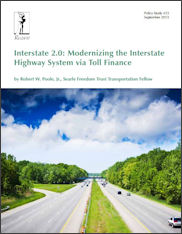 Virginia faces a $13.6 billion price tag (net present value) to reconstruct its aging interstate highways, estimates Robert W. Pool Jr., with the Reason Foundation in a new study, “Interstate 2.0: Modernizing the Interstate Highway System via Toll Finance.” The cost nationally of reconstructing the Interstate system is estimated to cost $589 billion (in 2010 dollars).
Virginia faces a $13.6 billion price tag (net present value) to reconstruct its aging interstate highways, estimates Robert W. Pool Jr., with the Reason Foundation in a new study, “Interstate 2.0: Modernizing the Interstate Highway System via Toll Finance.” The cost nationally of reconstructing the Interstate system is estimated to cost $589 billion (in 2010 dollars).
Over and above those costs, Virginia needs another $9.6 billion to widen and make other improvements to its Interstates, according to the study, part of $394 billion nationally.
How do we pay for it all?
Current sources of revenue are inadequate to pay the massive bill, contends Poole, who advocates a user-pays system of all-electronic tolling. Tolling once was an inefficient way to collect revenue but advances in electronic and tolling and have brought down the cost from 30% of revenue in times past to less than 5%. Tolling also plays better politically; in polls, motorists also say they object less to tolling than other forms of taxation.
The [optimal] way forward would be to adopt the principles of “value-added tolling.” That means asking highway users to pay tolls only in circumstances where those paying the new tolls would personally get significant added value. That is obviously the case if the tolls finance a new bridge, new lanes or a new toll road. But it would also be the cases if a major highway or bridge has reached the end of its original design life, or is significantly undersized for the travel demand.
Unlike fuels taxes, says Poole, toll rates can be tailored to the cost of each highway. “Under a fuel tax system, operators of cars and trucks pay a single average price to use all roads, regardless of their cost. It’s as if everyone paid a standard price for a car, regardless of its cost to produce and its various features. Under such a system, nearly everybody would want a Jaguar or a Rolls Royce.”
Tolls are fairer as well, he argues.”Because the toll rates are directly related to the costs of specific highways or bridges, people pay specifically for what they use and can avoid paying for what they do not use. … Those who extensively use Interstates (such as trucking companies) would pay rates that fully cover the cost of building, operating and maintaining those specific facilities.”
Another advantage is the self-limiting nature of a toll-financed system. The federal fuel tax has morphed into a general purpose federal transportation tax. But tolls would be used used to pay off bonds, and bond buyers impose stringent conditions on the use of revenues. Money would not wind up being spent on bridges to nowhere.
Finally, Poole argues, tolls can be structured to vary with traffic demand, making it a useful congestion-management tool. (As an example, he might have cited the variable-pricing tolls on Virginia’s stretch of the Washington Capital Beltway.)
I largely agree with Poole’s analysis. The more we move to market-based pricing for transportation, the more efficiently we will utilize our transportation system. My only question is whether we really need to make all the Interstate improvements that Poole suggests are needed. Aside from the demographic and economic forces dampening driving generally, if people paid directly for their Interstate usage, they might actually use it less. Some of those improvements might prove to be unnecessary.
Update: Toll express lanes on major highways wins 60% public support versus 10% for a vehicle-miles-driven charge, according to deliberative forums conducted by the Metropolitan Washington Council of Governments transportation planning board. So reports Toll Road News. (Hat tip: Larry Gross.)
— JAB


